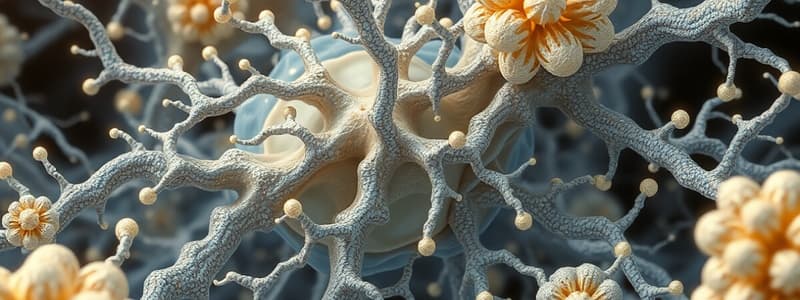Podcast
Questions and Answers
Which of the following is NOT a primary function of nerve tissues?
Which of the following is NOT a primary function of nerve tissues?
- Controlling and coordinating bodily functions
- Providing structural support for the body (correct)
- Carrying sensory information from the environment
- Transmitting signals between different parts of the body
Algae and sponges are examples of organisms that exhibit all levels of organization, from cells to systems.
Algae and sponges are examples of organisms that exhibit all levels of organization, from cells to systems.
False (B)
What is the main difference between an organ and a tissue?
What is the main difference between an organ and a tissue?
An organ is made up of different tissues working together to perform a specific function, while a tissue is a group of similar cells that perform a common function.
The ______ system is responsible for removing waste materials from the body.
The ______ system is responsible for removing waste materials from the body.
Match the following organs with their corresponding system:
Match the following organs with their corresponding system:
Which of the following is NOT a unicellular organism?
Which of the following is NOT a unicellular organism?
The cell is the most complex level of organization in living things.
The cell is the most complex level of organization in living things.
What is the name for a group of similar cells that work together?
What is the name for a group of similar cells that work together?
A ______ organism is made up of only one cell.
A ______ organism is made up of only one cell.
Match the following examples with their corresponding levels of organization:
Match the following examples with their corresponding levels of organization:
Flashcards
Levels of Organization
Levels of Organization
The hierarchical structure of living things from simple to complex.
Cell
Cell
The smallest unit of life; can be unicellular or multicellular.
Unicellular Organisms
Unicellular Organisms
Organisms made up of a single cell, e.g., Amoeba, Paramecium.
Multicellular Organisms
Multicellular Organisms
Signup and view all the flashcards
Tissue
Tissue
Signup and view all the flashcards
Organs
Organs
Signup and view all the flashcards
Systems
Systems
Signup and view all the flashcards
Muscle Tissues
Muscle Tissues
Signup and view all the flashcards
Excretory System
Excretory System
Signup and view all the flashcards




